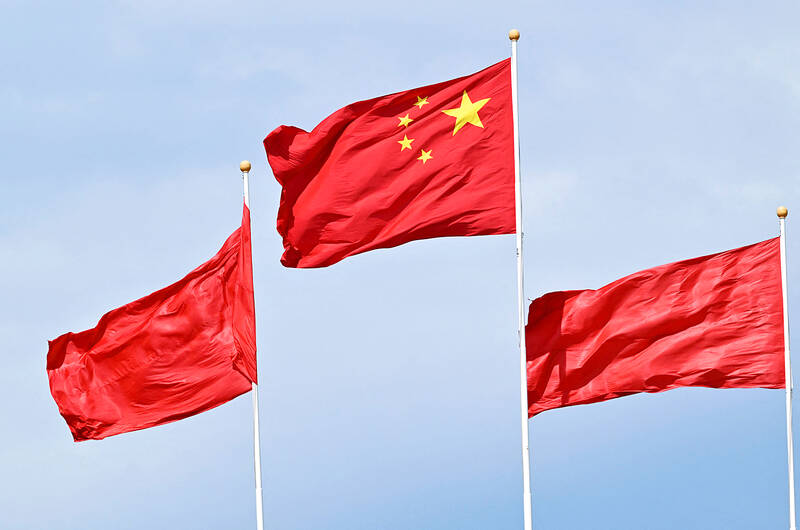The Georgia Institute of Technology is ending its research and educational partnerships in the Chinese cities of Tianjin and Shenzhen, the US university said on Friday, following scrutiny from the US Congress over its collaboration with entities allegedly linked to China’s military.
In May, the US House of Representatives Select Committee on Strategic Competition between the United States and the Chinese Communist Party wrote a letter to Georgia Tech asking for details on its research with China’s northeastern Tianjin University on cutting-edge semiconductor technologies.
The Chinese school and its affiliates were in 2020 added to the US Department of Commerce’s export restrictions list for actions contrary to US national security, including trade secret theft and research collaboration to advance China’s military.

Photo: Reuters
University spokeswoman Abbigail Tumpey said in an e-mail that Georgia Tech has been assessing its posture in China since Tianjin University was added to the entity list.
“Tianjin University has had ample time to correct the situation. To date, Tianjin University remains on the Entity List, making Georgia Tech’s participation with Tianjin University, and subsequently Georgia Tech Shenzhen Institute, no longer tenable,” Tumpey said.
Georgia Tech, a top tier US engineering school and major recipient of US Department of Defense funding, said in an accompanying statement that it would discontinue its participation in the Shenzhen institute, but that the approximately 300 students in programs there would have the opportunity to fulfill their degree requirements.
In January, Georgia Tech touted that its researchers based in Atlanta and at the Tianjin International Center for Nanoparticles and Nanosystems had created the world’s first functional semiconductor made from the nanomaterial graphene.
It said the breakthrough could lead to a “paradigm shift” in electronics and yield faster computing.
The US and China, intense geopolitical and scientific rivals, view semiconductors as a strategic industry with civilian and military uses, including quantum computing and advanced weapons systems.
In its May letter, the select committee said the Tianjin research center is affiliated with a Chinese company with subsidiaries that supply the Chinese People’s Liberation Army.
A Georgia Tech scientist who led the Tianjin project has defended the research, saying that all the results were available to the public and that the collaboration had passed extensive legal reviews.
The Chinese embassy in Washington did not respond immediately to a request for comment.

THE TRAGEDY OF PUNCH: Footage of the seven-month-old Japanese macaque has gone viral online after he was rejected by his mother and formed a bond with a soft toy A baby monkey in Japan has captured hearts around the world after videos of him being bullied by other monkeys and rejected by his mother went viral last week. Punch, a Japanese macaque, was born in July last year at Ichikawa City Zoo. He has drawn international attention after zookeepers gave him a stuffed orangutan toy after he was abandoned by his mother. Without maternal guidance to help him integrate, Punch has turned to the toy for comfort. He has been filmed multiple times being dragged and chased by older Japanese macaques inside the enclosure. Early clips showed him wandering alone with

South Korea would soon no longer be one of the few countries where Google Maps does not work properly, after its security-conscious government reversed a two-decade stance to approve the export of high-precision map data to overseas servers. The approval was made “on the condition that strict security requirements are met,” the South Korean Ministry of Land, Infrastructure and Transport said. Those conditions include blurring military and other sensitive security-related facilities, as well as restricting longitude and latitude coordinates for South Korean territory on products such as Google Maps and Google Earth, it said. The decision is expected to hurt Naver and Kakao

Australian Prime Minister Anthony Albanese yesterday said he did not take his security for granted, after he was evacuated from his residence for several hours following a bomb threat sent to a Chinese dance group. Albanese was evacuated from his Canberra residence late on Tuesday following the threat, and returned a few hours later after nothing suspicious was found. The bomb scare was among several e-mails threatening Albanese sent to a representative of Shen Yun, a classical Chinese dance troupe banned in China that is due to perform in Australia this month, a spokesperson for the group said in a statement. The e-mail

‘OCCUPATION’: Hong Kong said it had lodged ‘stern protests’ with Panama’s consulate, and would ‘staunchly support’ the rights and interests of Hong Kong companies Panamanian President Jose Raul Mulino on Monday ordered the temporary occupation of two ports run by a unit of CK Hutchison Holdings Ltd following the Supreme Court’s ruling against the firm’s concession, escalating a dispute that has become a proxy battle between the US and China in Latin America. Mulino said in a speech that the administration and operation of the two ports on the strategic Panama Canal is to revert to the country’s National Maritime Authority to ensure their uninterrupted, safe and efficient operation. The occupation covers movable equipment at the ports and does not mean a definitive loss of